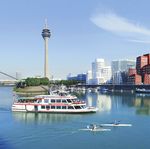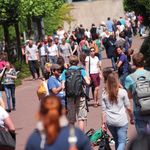Online seminar: Marie S.-Curie Masterclass for Postdoctoral Researchers
←
→
Page content transcription
If your browser does not render page correctly, please read the page content below
Photo: Jörg Reich
Photo: Ivo Mayr
Photo: Ivo Mayr
© Düsseldorf Marketing & Tourismus GmbH – Fotograf U. Otte
Photo: Ivo Mayr
Photo: Ivo Mayr
Online seminar:
Marie S.-Curie Masterclass for Postdoctoral
Researchers
Organiser: Department Research Management & Transfer, Heinrich Heine University Düsseldorf
When: 18.05.2021 & 19.05.2021 – 10.00 to 12.30 hrs
hhu.deMarie S.-Curie Masterclass
18.05.2021 & 19.05.2021 – 10.00 to 12.30 hrs
Register here
18.05.2021 – Topic: How to apply and write a successful
Day 1
proposal
Welcome by the Vice President for International Relations and Science
10.00 hrs Communication & Introduction by the Department Research Management &
Transfer
Introduction of the EU’s Marie S.-Curie Postdoctoral Fellowship scheme by the
10.15 hrs German National Contact Point for Marie Skłodowska-Curie actions with tips
on how to write a successful proposal
12.30 hrs End of day 1
19.05.2021 – Topic: Your host institution, tips & tricks for
Day 2
your application
Your host institution: services during proposal preparation & cross-cutting
issues relevant to your proposal
10.00 hrs
(information on soft skills training, research data management, Welcome
Center, equal opportunity offers etc.)
11.00 hrs Meet successful applicants
11.45 hrs Summary of most important findings & next steps up to proposal submission
12.30 hrs End of Marie S.-Curie Masterclass 2021Marie Skłodowska-Curie
Postdoctoral Fellowships
Are you a talented researcher planning your next career move? A research
stay in another country is an invaluable opportunity to gain new knowledge
and skills, expand your network and advance your career.
What types of Postdoctoral Fellowships exist?
European Fellowships
• Held in EU Member States or Associated Countries (e.g. at HHU)
• Fellowships last 12-24 months
• Researchers can be of any nationality
• Open to all topics
Global Fellowships
• The fellowships require an outgoing phase of 12-24 months in a non-associated Third Country (e.g.
USA), and a mandatory 12-month return phase to a host organisation based in an EU Member State or a
Horizon Europe Associated Country (e.g. at HHU)
• Open to European nationals or long-term residents of EU Member States or Horizon Europe Associated
Countries (exceptions for refugees)
• Open to all topics
Both Fellowships can also include a secondment period in another organisation. An additional period of up
to six months in a non-academic organisation in an EU Member State or Horizon Europe Associated Country
is also possible at the end of the project.
Who can apply? What are the eligibility criteria?
• Supported fellows must be postdoctoral researchers at the date of the call deadline, i.e. in a
possession of a doctoral degree, defined as a successfully defended doctoral thesis, even if the doctoral
degree has yet to be awarded (special rules apply to a medical doctor degree).
• New rule: At the call deadline, supported researchers must have a maximum of 8 years full-time
equivalent experience in research, measured from the date that the researcher was in a possession
of a doctoral degree and certified by appropriate documents. Years of experience outside research and
career breaks (e.g. due to parental leave), will not be taken into account.
• Recruited researchers must comply with the following mobility rule: they must not have resid-ed
or carried out their main activity (work, studies, etc.) in the country of the beneficiary (for European
Postdoctoral Fellowships), or the host organisation for the outgoing phase (for Glob-al Postdoctoral
Fellowships) for more than 12 months in the 36 months immediately before the call deadline. For
researchers wishing to reintegrate from a third country, there must be a direct mobility to an EU
Member State or Horizon Europe Associated Country within the last 12 months before the call deadline.
Compulsory national service, short stays such as holidays and time spent as part of a procedure for
obtaining refugee status under the Geneva Convention are not taken into account.Marie Skłodowska-Curie
Postdoctoral Fellowships
How does the evaluation work?
• In Postdoctoral Fellowships, proposals will be evaluated by one of eight ‘main evaluation panels’:
Chemistry (CHE), Social Sciences and Humanities (SOC), Economic Sciences (ECO), Information Science
and Engineering (ENG), Environment and Geosciences (ENV), Life Sciences (LIF), Mathematics (MAT),
Physics (PHY).
• Applications will be evaluated by experts, based on the award criteria ‘excellence’, ‘impact’ and ‘quality
and efficiency of the implementation’.
New: Please note that multidisciplinary panels (Career Restart, Reintegration, Society and En-terprise) no
longer exist.
What are the success rates?
Usually around 15%
How about timing?
• Opening of the call and publication of final documents: 15 April 2021
• HHU Marie S.-Curie Masterclass: 18-19 May 2021
• Deadline of the call: 15 September 2021, 17.00 Brussels time
• Projects can usually start about 8 months after the deadline.
Important Information
Please note that the new European Framework Program Horizon Europe has just started and therefore the
rules for Marie S.-Curie Fellowships are changing as well. The information in this factsheet is based on
preliminary information. The official documents will be published in April and therefore there may still be
deviations from the above rules.You can also read























































